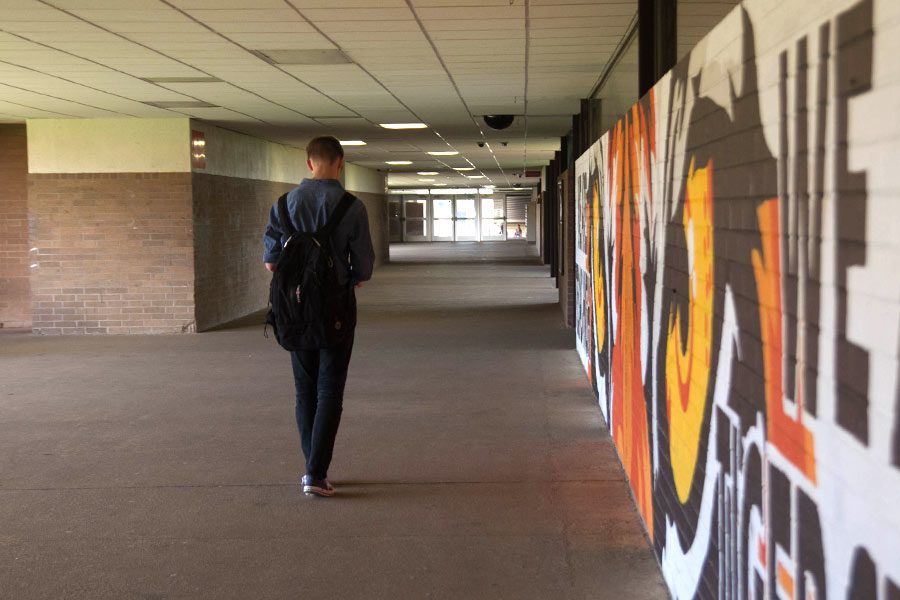Saved by the bell
Additional class, different schedule aim to shorten school year
Photo by Brianna O’Shaughnessy
May 24, 2016
When the first bell rings for the new school year, returning students will flow into the bustling hallways, excited to start a new year while adapting to major changes in the bell schedule.
School will now start at 8:25 a.m. in an attempt to abide by a new law that counts mandatory school time in minutes as opposed to hours. This makes it easier to manipulate the schedule in order to shorten the length of the school year.
“In order for us to get out of school a little bit earlier in the year, we can bank that [five extra minutes] and change the time between classes to six minutes, so then we would get out early,” Principal Brad Bailey said. “The students’ last day would be May 25, which is a Thursday, and our teachers would get out May 26.”
Sophomore Cameron Tarpley is in favor of starting the school day earlier in order to not only conform to the new law, but also to get out earlier for summer.
“I like the whole deal about staring five minutes earlier,” Tarpley said. ‘It’ll give me more time to work during the summer.”
In addition to adding five minutes to the beginning of the school day, the school is experimenting with a new lunch schedule as well, planning on eliminating one lunch to give more room. Current lunch levels range from 350-400 students, but the loss of one will increase that number to around 550 students.
“We’re anticipating that everything will go smoothly, but this will be a transition year, and we can make adjustments as needed,” Bailey said. “The main thing I’m concerned about is the lunch line, making sure we get our food out quicker, so our cafeteria workers will have a little more pressure to have food ready to serve.”
The new lunch schedule isn’t just for experimentation; the high school is planning on installing an extra 30-minute class period into the school day with the time afforded by the eliminated lunch period. This was proposed in response to the small amount of time students have on their own to participate in extracurriculars.
“The reason behind this is to give more opportunities for our students to participate and have meetings,” Bailey said. “For example, we’ve got tutorials and it’s hard to find time unless you pull kids out of class, so we can have a 30 minute assigned tutorial for EOC. We can do clubs and activities, like UIL academics.”
Sophomore Jake Weems looks forward to the 30-minute period to catch up on assignments or practice.
“The extra period gives us time to do stuff like finish up some asssignments we didn’t get a chance to finish the night before,” Weems said. “And I will probably use it to practice for band.”
Students may be confused about how the new 30-minute period will interact with their pre-existing schedules. In order to find classes that will fit in with students’ individual schedules, the administration will be composing a list of classes that are contenders for the new period, and then will take surveys from both teachers and students.
“For example, if there was an art class you couldn’t get into, then you tell us and if we can make that work, we’ll put that as part of a class,” Bailey said. “[The classes] won’t be for an extra grade, and we won’t put extra pressure on you for that part. It will be an enrichment class and unweighted.”
Bailey said that students who did not pass EOC tests may be assigned to remediation tutorials during the new class.
“Depending on the need, we can make it work however,” Bailey said.
Some teachers find the new schedule beneficial, helping them fit in time for tutorials.
“I like the fact that we will be able to hold tutorials during this 30-minute block instead of losing [some of] our conference period to hold tutorials,” English teacher Anita Badgett said. “Groups and organizations can also hold meetings during that block, so they don’t have to meet after school.”
Other teachers find the new schedule harmful, speaking from their previous experiences.
“Coming from the middle school, we’ve already had 30-minute classes,” world history teacher Cedina Campbell said. “There were several complications, especially if students are in tennis or go to the college for some kind of class. Because of the changing of the classes for that 30 minutes, and coming in, getting settled, and getting ready to leave, I’m not sure there’s going to be a lot of time for instruction, so this is a big concern of mine, and I’m not sure I’m wholeheartedly excited about the new 30 minutes.”
Despite all of these changes, the administration remains optimistic that all will go smoothly.
“We’re still a work in progress, and we’re trying to make sure it will be effective and works well,” Bailey said. “We’ve gotten a lot of positive feedback from our teachers, and the next phase is to get with the students and see their thoughts on it.”















